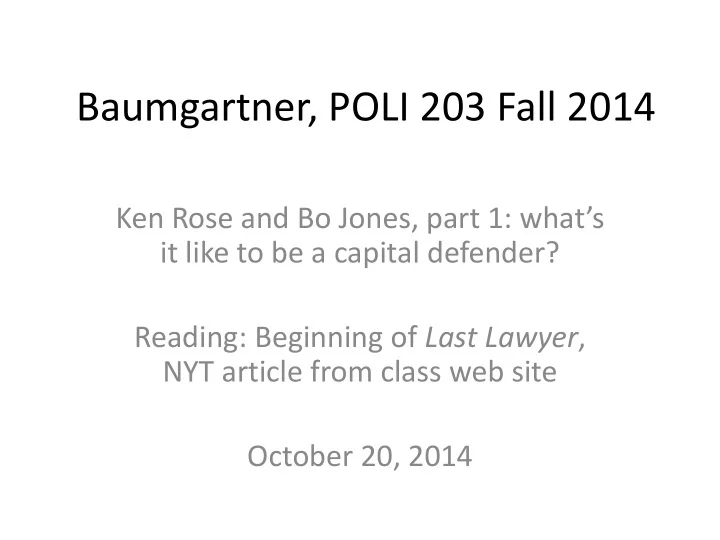

Baumgartner, POLI 203 Fall 2014 Ken Rose and Bo Jones, part 1: what’s it like to be a capital defender? Reading: Beginning of Last Lawyer , NYT article from class web site October 20, 2014
Catching up • Two more exonerations since last Wednesday’s class, no kidding • Law School event tomorrow evening at 5:30pm, room 5048 Law, re: McCollum and Brown • Speaker Wed: LaMonte Armstrong and Theresa Newman (Duke Innocence Project)
Conviction Integrity Units • Read on class web site about Dallas, TX and Brooklyn, NY • Consider McCollum and Brown • Sometimes the new DA thinks the old DA made mistakes • This is very unusual, for many reasons
Huge predictor of exonerations • Faced with evidence such as that in McCollum’s case, the DA may: – Put up a fight, refuse to cooperate • Joe Freeman Britt: “apparently the district attorney just threw up his hands and capitulated.” – Or, cooperate, drop the charges, and apologize • Apologizing is extremely rare… • Creating a conviction integrity unit brings the DA’s office out of the dynamic of confrontation, pride, and self-defense
Death Row Attorneys • Many of the best ones nationally are right here in NC. Jack Boger argued McCleskey. • CDPL, in Durham, is the only organization of its kind, nationally – They organize defense for all capital defendants, state-wide, assigning lawyers – They train lawyers – They have a lot of experience, doing nothing else but capital law.
Two historical periods • NYT article is from 1988. – Laws were expanding the use of DP – Inmates were reaching the end of their appeals – Executions were accelerating – Defense attorneys very commonly losing their cases, clients being put to death – Hard work… – Public opinion strongly against you – Especially in the towns and counties where you are doing the work: Mississippi, Texas, SC, GA, NC
More recent period • Tide changed in 1990s • More optimism • More successes • One success leads to another: concern about exonerations leads, naturally, to reforms that may lead to more exonerations… – Example: DA’s creating Conviction Integrity Units…
Conditions of work • NYT story from 1988: not uncommon for attorneys to be paid $1,000 to $2,500 as a flat fee for a capital defense – This no longer so common, but it was at the time – Many people currently on death row are from that time • Pro-bono law firms take the cases • CDPL not such a thing; it is result of reform
People hate what you do • How to defend a murderer? • Public opinion always on the other side… • Most clients are guilty, many did awful things… • But: • Death is different • The system does not work when one side simply folds its hands… Adversarial nature of the system requires a defense just as vigorous as the prosecution will be. Interesting paradox.
Takes an iron stomach • People hate you • You may well not like your client • Your client may want to die • Your client may be out of his / her mind • The state is coming at your client with intent to kill him/her, and quite likely they will succeed (at least up until the 1990s)
Save your client on a technicality? • Sweeping arguments that could end the death penalty: – Race (McCleskey): Nope. – Geography: Nope. – Arbitrary: Nope. (Furman said this, but not since then) • So, “hand -to- hand combat” – each case its own details, look for flaws, overlooked elements in the earlier trial
Denigrate the work of your colleagues? • Appeals often rely on “Ineffective Assistance of Counsel” – Original lawyer was incompetent or worse • Easy to do when the person was asleep or called no witnesses, or was drunk, etc. • But what about when they did a good job but just missed a detail? • To save your client, you may have to argue that this was an unconstitutional failure, basically one of incompetence. You have to argue it, the court can turn you down. • Not a great way to make friends, or keep them.
Wednesday • Read the stories on the class web site • We start in on the Bo Jones case
Recommend
More recommend